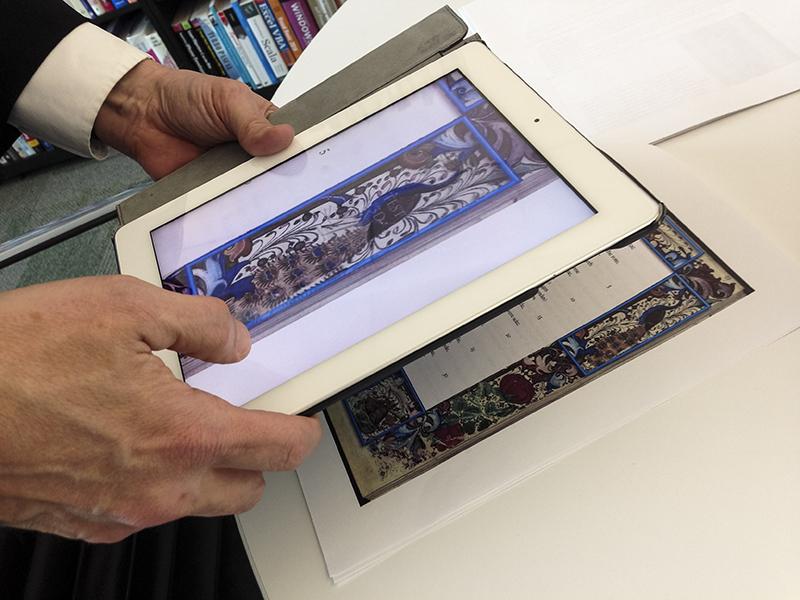Tablets are the future, and NKU is getting ready
Kirby demonstrates an iPad based teaching tool developed by English professor Tamara O’Callaghan. The tool, used for her Middle English course, uses the iPad’s camera function to scan art based QR codes, and provide context to student’s reading.
With over 80 percent of NKU students using laptops, tablets and iPads to complete their school work, according to the office of Information Technology, tablet computers are looking to revolutionize higher education, and NKU is now taking steps to ensure it is prepared for this shift in technology.
“At this point, as [tablets] get more powerful, and more affordable, they will be irresistible to academia,” said Kevin Kirby, dean of the College of Informatics, who is also responsible for team teaching a class that heavily utilizes the use of Apple iPads in the curriculum.
The iPads are used in class for learning assignments, such as examining how packets are sent across the internet, basic concepts of computer programming, and even games utilizing tone generation apps, where students must communicate using codes and unique frequencies to be heard above the noise of the rest of the class completing the activity.
“All of these examples are easier on a tablet,” Kirby said.
Each student in the class is lent out an iPad 2 to take home for completion of class assignments, as well as for their personal use.
“Tablets are portable, they are lightweight, they are instantly on,” Kirby said of the benefits of the iPads when compared to traditional laptops.
Kirby says that the iPads used in the class align with the goals that President Geoffrey Mearns set out in the Fuel the Flame initiative at his Spring Convocation address.
“It is not explicit in ‘Fuel the Flame,’ but it is implicit. Most of all, it ties to innovation,” Kirby said.
Kirby also lauded the iPads for their capabilities to further drive “transdisciplinary” learning, a holistic form of learning that crosses multiple disciplines, which has drawn interest from faculty outside of the STEM principles.
“It’s not just inside informatics, there are interested people in other colleges,” Kirby said.
One of these interested people is Kathleen Quinn, a history professor who is team teaching the informatics class with Kirby this semester. She found several ways to implement the tablets into the curriculum of her Global Viewpoints course.
“The students utilize the tablets for a variety of functions,” said Quinn, who uses the tablets in class to closely examine museum artifacts. “They can zoom in on the artifacts. They can look at the details.”
Quinn hopes the modern manner in which students are able to view history with the iPads will help them grasp the class’ concepts.
“It’s taking art skills, graphic design, and adding it to history and hopefully that helps students to become more engaged in the material,” Quinn said. “Learning is hard, and this maybe gives a window into a different type of information that might make a student excited about a topic.”
Although Quinn said that the iPads used in her class were useful for activities, such as examining ancient coins in detail far beyond what could be observed with the human eye, she expressed concern that the importance of tablets in interactive learning is being overly emphasized.
“I think we shouldn’t think of the iPad as a panacea that is going to solve all of our problems,” Quinn said.
While professors are looking at new ways they can incorporate tablets into their classes, NKU’s Communications & Marketing department is taking steps to upgrade the NKU website to accommodate tablet and mobile platforms.
“We are working with IT very aggressively,” said Jim Nilson, director of Communications & Marketing. “My number one goal on my plate is making that happen.”
The plans for a tablet version of the website are in the middle of planning stages, but at this time, the tablet version of the NKU app will sport “responsive content” that moves around depending on the device it is being accessed through, as well as a design inspired by the recently rebooted iNKU application.
“The layout would resemble what you see in the app. It would serve more of a functional purpose,” Nilson said.


